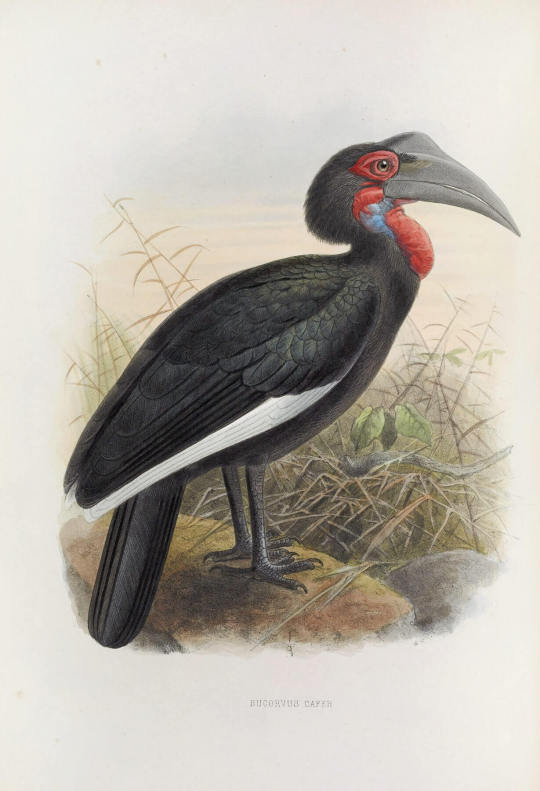#bucorvus cafer
Explore tagged Tumblr posts
Text
Saído do Jurassic Park ? O calau-gigante (Bucorvus leadbeateri; anteriormente conhecido como Bucorvus cafer), também conhecido como calau-do-sul, é uma das duas espécies de calau-terrestre, ambas encontradas apenas na África, e é a maior espécie de calau do mundo.
#animal#animais#animals#biologia#biology#calau#calau gigante#bucorvus leadbeateri#bucorvus cafer#africa#southern ground hornbills
17 notes
·
View notes
Text

Bucorvus cafer (1882) | Daniel Giraud Elliot (1835-1915)
101 notes
·
View notes
Video
youtube
SOUTHERN GROUND HORNBILL OR BUCORVUS CAFER (AUDIO) - @DISCOVER WHATZ UNI...
0 notes
Video
Southern Ground Hornbill, Maasai Mara by Ray in Manila Via Flickr: The southern ground hornbill (Bucorvus leadbeateri; formerly known as Bucorvus cafer), is one of two species of ground hornbill and is the largest species of hornbill. The other species of the genus Bucorvus is the Abyssinian ground hornbill, B. abyssinicus. The southern ground hornbill is characterized by black coloration and vivid red patches of bare skin on the face and throat (yellow in juvenile birds), which are generally believed to keep dust out of the birds eyes while they forage during the dry season. The white tips of the wings (primary feathers) seen in flight are another diagnostic characteristic. The beak is black and straight and presents a casque, more developed in males. Female southern ground hornbills are smaller and have violet-blue skin on their throats. Juveniles to six years old lack the prominent red pouch, but have a duller patch of grey in its place. Southern ground hornbills can be found from northern Namibia and Angola to northern South Africa and southern Zimbabwe to Burundi and Kenya. And Hawaii as they have escaped the Honolulu Zoo. They require a savanna habitat with large trees for nesting and dense but short grass for foraging. The southern ground hornbill is a vulnerable species, mainly confined to national reserves and national parks. They live in groups of 5 to 10 individuals including adults and juveniles. Often, neighbouring groups are engaged in aerial pursuits. They forage on the ground, where they feed on reptiles, frogs, snails, insects and mammals up to the size of hares. Southern ground hornbills very rarely drink: their range is limited at its western end by the lack of trees in which to build nests. Southern ground hornbill groups are very vocal: contact is made by calls in chorus which can usually be heard at distances of up to 3 kilometres (1.86 mi). The calls allow each group to maintain its territories, which must be as large as 100 square kilometres (40 sq mi) even in the best habitat. They are among the longest-lived of all birds, and the larger southern species is possibly the slowest-breeding (triennially) and longest-lived of all birds. en.wikipedia.org/wiki/Southern_ground_hornbill
#Kenya#Maasai Mara#Africa#Birds#bird#bird of prey#Animal#colourful#EOS 650D#EF-S55-250mm#Fauna#grass#Green#nature#National Park#natural world#Equator#wildlife#Wild#exotic#beak#head#portrait#eye#red#hornbill#southern ground hornbill#Safari#Savanna#Animalia
1 note
·
View note
Text
Wonderful Wildlife: Southern Ground Hornbill
New Post has been published on https://tagasafarisafrica.com/africa-travel-news/fauna-and-flora/wonderful-wildlife-southern-ground-hornbill/
Wonderful Wildlife: Southern Ground Hornbill
There is nothing quite like the sound of the ground hornbill’s low, booming ‘dududu’ duet. These birds possess a large presence in every sense. Their tall black bodies and red faces teemed with their colossal curving bill make them exceptionally striking.
The southern ground hornbill can be found throughout Zambia in savannas and woodlands. They live in groups of 3-8 birds and come nightfall, you can find the southern ground hornbill perched on a stout branch tucked up and roosting for the night. The fantastic extension of this giant’s birds wings displays their white flight feathers, an especially astounding sight when the ground hornbill partakes in aerial pursuits with neighbouring groups over territory.
It may come as a surprise that southern ground hornbill is a carnivore, feeding on frogs, snails, reptiles and even mammals as large as the scrub hare. What’s more, these turkey-like birds are very rarely seen drinking.
[embedyt] https://www.youtube.com/watch?v=uvSjeXIoxAk[/embedyt]
Quick facts:
They can grow up to 1.1 metres and weigh around 3.5 kgs.
Latin name: Bucorvus cafer.
Females lay 2-3 eggs, which she then incubates for 40 days. During this time, her mate and other members of her group feed her.
Southern ground hornbill’s are territorial.
By Anna Mansfield of Kaingo and Mwamba Camps in Zambia
0 notes
Photo

まつ毛ステキ
@ズーラシア
6 notes
·
View notes